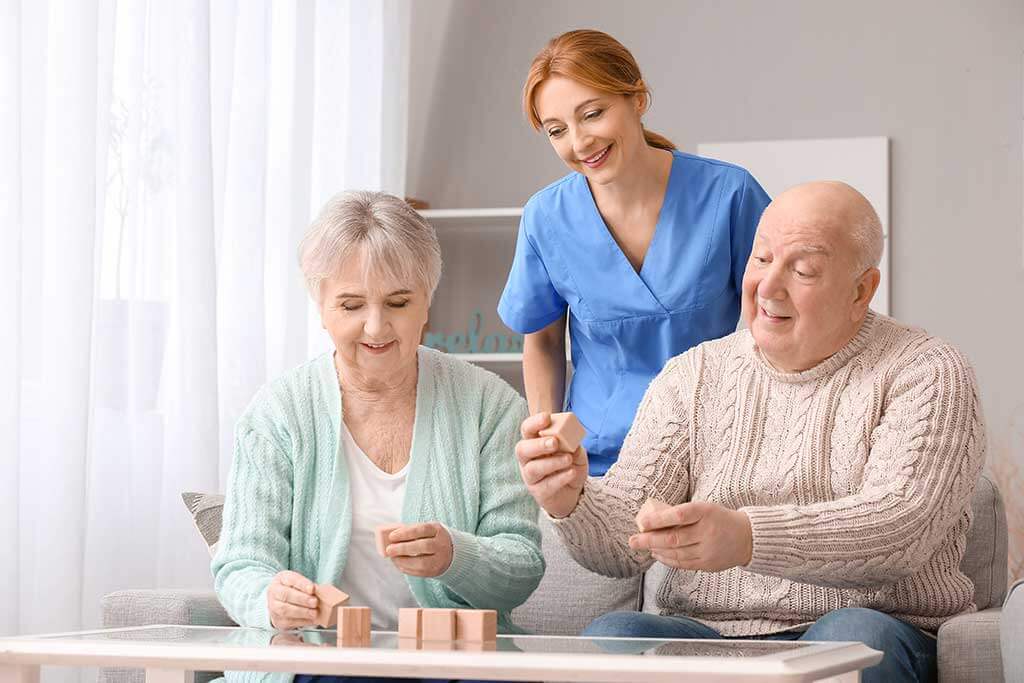Involving Tasks in Memory Treatment: Enhancing Wellness in your home
In the world of memory treatment, the value of engaging activities can not be overemphasized. These activities offer as a foundation in enhancing the overall health and wellbeing of people living with memory disabilities.
Benefits of Involving Tasks
Engaging tasks play a crucial duty in enhancing cognitive feature and psychological wellness in people getting memory care in the house. These activities are made to promote the mind, encourage social communication, and supply a sense of objective for those experiencing amnesia. By taking part in tasks such as problems, reminiscence therapy, music treatment, and art jobs, individuals can improve their cognitive abilities, memory retention, and general lifestyle.
One considerable advantage of engaging tasks is the positive influence they have on cognitive function. Activities that challenge the brain, such as word video games or mind teasers, help enhance memory, focus, and problem-solving skills. This mental excitement is crucial for people with memory impairments as it can reduce cognitive decline and enhance brain function.
In addition, engaging activities additionally advertise psychological well-being by minimizing feelings of isolation and clinical depression. Joining team tasks or one-on-one sessions with caregivers can increase state of mind, rise self-worth, and produce a feeling of belonging. These psychological advantages are important for maintaining a favorable overview and total psychological health in individuals receiving memory treatment in your home.
Producing a Sensory Experience

Including sensory experiences can be achieved through different activities. Aesthetic stimulation can be offered via vibrant items, art work, or nature scenes. Playing acquainted music or noises can trigger memory and create a calming ambience. Responsive activities such as textured items or materials can promote sensory exploration and promote the feeling of touch. In addition, incorporating familiar scents like lavender or newly baked cookies can evoke positive memories and sensations of convenience.
Including Acquainted Pastimes
Incorporating acquainted leisure activities right into memory treatment activities at home can offer a sense of connection and joy for people with memory impairments. Engaging in activities that individuals have actually taken pleasure in throughout their lives can stimulate positive emotions, boost memories, and foster a feeling of achievement. Whether it's paint, knitting, horticulture, or playing a musical instrument, acquainted hobbies offer a calming and significant means for people with memory obstacles to connect with their past selves and preserve a sense of identity.
By integrating familiar hobbies into everyday routines, caregivers can create a sense of normality and objective for their liked ones. These activities not only work as a source of amusement but also aid in lowering stress and anxiety, boosting other state of mind, and promoting cognitive feature. In addition, taking part in familiar hobbies can stimulate conversations, urge social communications, and improve overall wellbeing.
Caregivers need to adjust these leisure activities to suit the individual's current abilities and interests, making sure a secure and delightful experience. Giving the essential assistance and support, caretakers can assist individuals with memory impairments continue to find gratification and happiness with their favorite pastimes.
Music and Memory Connection
The relationship in between music and memory is a powerful and well-documented sensation, demonstrating significant impacts on cognitive function and psychological health. Memory Care Charlotte. In the context of memory care, leveraging this connection can be a valuable device in improving the quality of life for people dealing with memory disabilities
Music has an unique ability to evoke emotions and memories from the past, even in people with sophisticated phases of dementia. Paying attention to acquainted tunes this hyperlink or participating in songs therapy sessions can promote neural paths related to memory and emotion, improving and triggering memories mood. Moreover, engaging with songs can help in reducing frustration, anxiety, and tension generally experienced by individuals with cognitive decrease.
Caregivers and family participants can include music into day-to-day regimens by producing individualized playlists of cherished tunes, arranging sing-along sessions, or motivating people to play music instruments. By integrating songs right into memory treatment activities, it is possible to develop purposeful experiences that promote cognitive stimulation, psychological connection, and general well-being in individuals with memory impairments.
Mind-Boosting Gamings

Gamings like crossword problems, Sudoku, memory matching video games, and facts tests are prominent options for individuals in memory treatment. These tasks not just supply entertainment but also offer a structured way to work out the brain. Additionally, video games that include strategy and crucial thinking, such as chess or card video games, can help improve cognitive abilities and reasoning abilities.
Moreover, these mind-boosting video games can have a favorable effect on mood and psychological wellness. Involving in delightful tasks and experiencing success in fixing issues or completing challenges can boost self-confidence and self-confidence. Overall, including mind-boosting video games into a memory treatment routine can contribute considerably to the total top quality of life for individuals with memory impairments.
Verdict
Finally, involving activities in memory treatment play a look at more info crucial duty in improving wellness at home. By developing sensory experiences, integrating acquainted leisure activities, discovering the songs and memory connection, and engaging in mind-boosting games, people can improve their cognitive capabilities and general top quality of life. These tasks provide mental stimulation, social communication, and a sense of function, ultimately bring about a more satisfying and improving experience for those dealing with memory impairments.
Building on the structure of emotional and cognitive advantages acquired from involving tasks, the unification of sensory experiences can further enhance the wellness of individuals getting memory treatment at home. For people with memory problems, sensory tasks can evoke memories, decrease anxiety, and improve overall state of mind.
Including acquainted leisure activities right into memory care activities at home can supply a sense of connection and happiness for people with memory disabilities.Games like crossword challenges, Sudoku, memory matching games, and trivia quizzes are preferred choices for people in memory care. Overall, including mind-boosting games right into a memory care routine can add significantly to the total high quality of life for individuals with memory impairments.